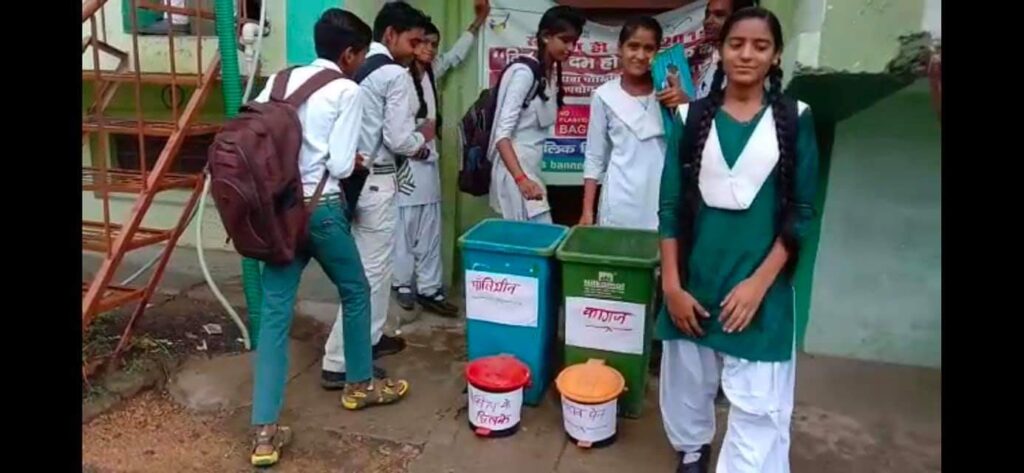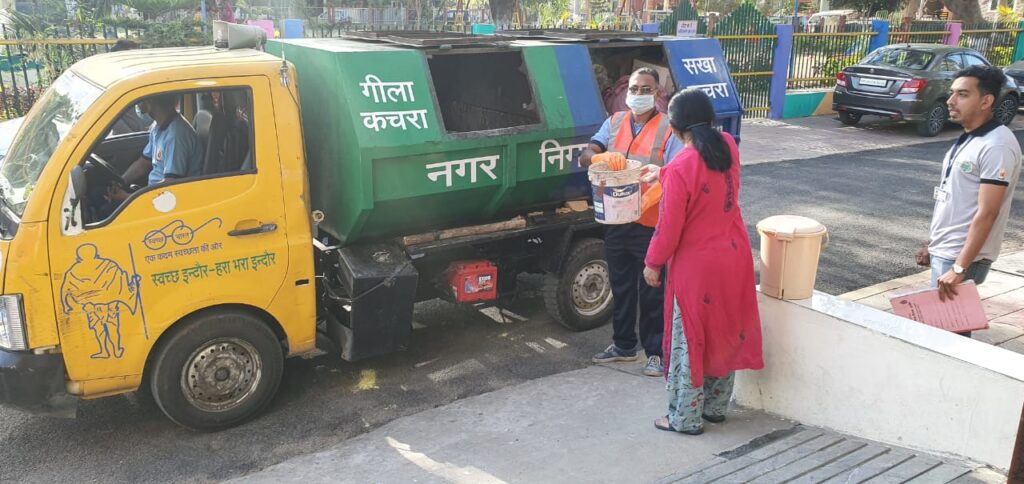Indore needs no introduction. The city has created its own identity in the recent past by winning four consecutive titles for India’s cleanest city. Its efforts on waste management have become a subject of study for global practitioners on sanitation and waste.
Presently, the city remains worst-hit by the pandemic in the central state of Madhya Pradesh. Yet, the city and its residents have shown that despite a public health crisis, having a robust waste management system is possible. ‘Indore Model’ has become possibly the best case study on sustainable sanitation and waste management in the country.
“Over the years, Swachh Survekshan has become a movement of people. It has become citizens’ exercise rather than the municipality or government-driven competition. Indore is no more competing with other cities, it is competing with itself,” says Shrigopal Jagtap who has been working for the past five years along with Indore Municipal Corporation (IMC).
The city registered 5647 marks out of 6000, highest amongst more than 4000 urban local bodies that participated in the competition. The mantra behind the city’s successful performance in the Swachh Survekshan, an annual cleanliness survey organized by the Ministry of Urban Affairs, remains basic i.e. source segregation.
The city boasts to have 100% source segregation in all the 85 wards and bulk waste generating institutes. The waste segregated at the household level until it reaches the disposal facility goes completely in a segregated state. At no stage, is the waste mixed. The municipality has been able to ensure an end to end segregation support resulting in the efficient handling of waste generated in the city. Experts believe this as one of the major achievements of IMC and also a major factor enabling the city to perform exceptionally well.
“There are 85 wards divided into 19 zones. At present, all wards are practicing 100% source segregation. We have prepared micro plans for all these wards, conducted stakeholder mapping for bringing all the entities generating waste and that had a role in managing waste on board,” explains Jagtap.
He further says, “every vehicle that goes to collect waste in these wards is properly designed to support transportation of segregated waste. Each vehicle has a driver, helper and a community representative that acts as a communication bridge between the household and municipality. We have fixed timing schedules and routes for vehicles.”
“The timely operation of these vehicles have made residents so familiar that they keep their waste bags ready in advance. It has become a habit,” adds Jagtap.
The city has undergone a complete transformation in terms of its waste management services. Six years ago nobody could have thought of Indore becoming a model city with its disintegrated waste management systems. However, since the survey began in 2016, the city officials and civil society understood the problem and mobilized stakeholders in order to ensure that city becomes sustainable in terms of its waste handling and disposal.

(School students participating in a segregation campaign in Indore. Credits: Shrigopal Jagtap)
Swati Singh Sambyal, a renowned waste management expert says, “Indore has taken an all-round approach. They evaluated the challenges that the city faced with respect to waste management and accordingly developed a roadmap to strengthen their infrastructure that supported segregation. Since the very beginning, the focus has been on behavior change, which is extremely essential.” She further says, “Indore has believed in innovation and has reinvented its waste management systems every year.”
The city started taking mini-steps by doing pilots and making ward by ward go zero waste. In 2020, after creating zero waste wards, Indore plans to conduct zero-waste events.
“Indore is thinking way ahead. After zero waste wards, it is going for zero waste events which will really be a game-changer. This is the specialty of Indore. They have been extremely innovative since the beginning of the survey, resulting in top-notch performance”, says Anil Prakash, Deputy Team Leader for Swachh Bharat Mission at Ministry of Housing and Urban Affairs, Government of India.
Post COVID-19, Indore has encouraged its residents to segregate waste not just in two streams but in four; dry, wet, domestic hazardous and domestic bio-medical waste. RWAs and colonies are now practicing four bins approach for ensuring the proper handling of waste in the times of pandemic and minimizing the risk of infection spread.
“Indore model is all about its holistic structure. Right from citizens to MLA, it integrates everyone towards one purpose; creating a clean city. In big cities, Indore is probably the first to have worked on both kinds of waste management systems; decentralized and centralized. It has undertaken elaborate plans for bioremediation of landfills which used to be a big concern for environmental pollution,” says Kaustub Parihar, an Environmental Planner and Civil Engineer.
As per the city’s former Collector, during the beginning years, Indore’s segregation rate was close to 5%. Indore’s composting and disposal facilities were in a deplorable state. At present Indore has more than 500 decentralized and home composting units that are treating the wet waste generated from households at the source. It is not at all reaching the landfill.
“Segregated waste has ensured less burden on treatment facilities. Composting at the household level has played a crucial role in this. The municipality has done well in encouraging people to adopt compositing solutions for wet waste” says Kaustub.

(Driver, helper and a community representative play an integral role in facilitating the segregation process in local communities. Credits: Shrigopal Jagtap)
Another striking feature of the “Indore model” has been the sense of ownership residents take in making the waste management process smooth and streamlined. “We do have fines for the violation but residents hardly do that now. Sometimes, it might be the bulk waste generators but largely we don’t have to fine anyone in the city anymore”, says Jagtap.
Such healthy participation of citizens has ensured that there is no scope for policing people to segregate their waste and keep the streets clean. With most of the cities taking the policing route by imposing fines and penalties, Indore can be a good example to follow.
Coupled with citizen engagement, Indore has also made giant strides in upgrading its infrastructure and service delivery mechanisms. IMC has converged major urban policies like Atal Mission for Urban Rejuvenation and Transformation (AMRUT), National Smart Cities Mission etc. for maintaining its waste management systems.
“Indore has been one of those cities that have integrated the national urban policies for its day to day monitoring of waste management operations. The Integrated Command and Control Center setup under Smart Cities Mission is being used by the municipality for monitoring the garbage collection vans, the status of transfer stations and city’s segregation data,” informs Kaustub. He further adds, “schemes like AMRUT has been utilized by the municipality for mobilizing adequate funding and sustaining its efforts on waste management. Better contract management with private vendors has been another crucial aspect of Indore’s top-notch performance.”
Basic functions like road sweeping have also been supplemented with the state of art machines which can go on to clean 300 to 400 Kms of road stretch at one go. The transfer stations have also been upgraded and fitted with automatic systems ensuring that the waste gets dumped in a segregated form only.
At present, waste recovery facilities in Indore are segregating waste in 12 categories.
All these efforts by municipality and citizens are further strengthened by proactive interest and participation by the political leadership. “From municipal councilors to MPs, political leaders have talked extensively about cleanliness. They have been quick on decision-making front and have shown faith in municipal officers and civil society organizations,” says Jagtap.
As Indore prepares for Swachh Survekshan 2021, the city has come a long way in making its waste management systems self sustainable. The efforts of municipality and civil society have also excelled in making people change their behavior and contribute positively in building the city’s sanitation systems.
(Rishabh is a Co-Founder at SDC Foundation. He tweets at Writer_Rishabh)
Banner Image: Medium & Business Today